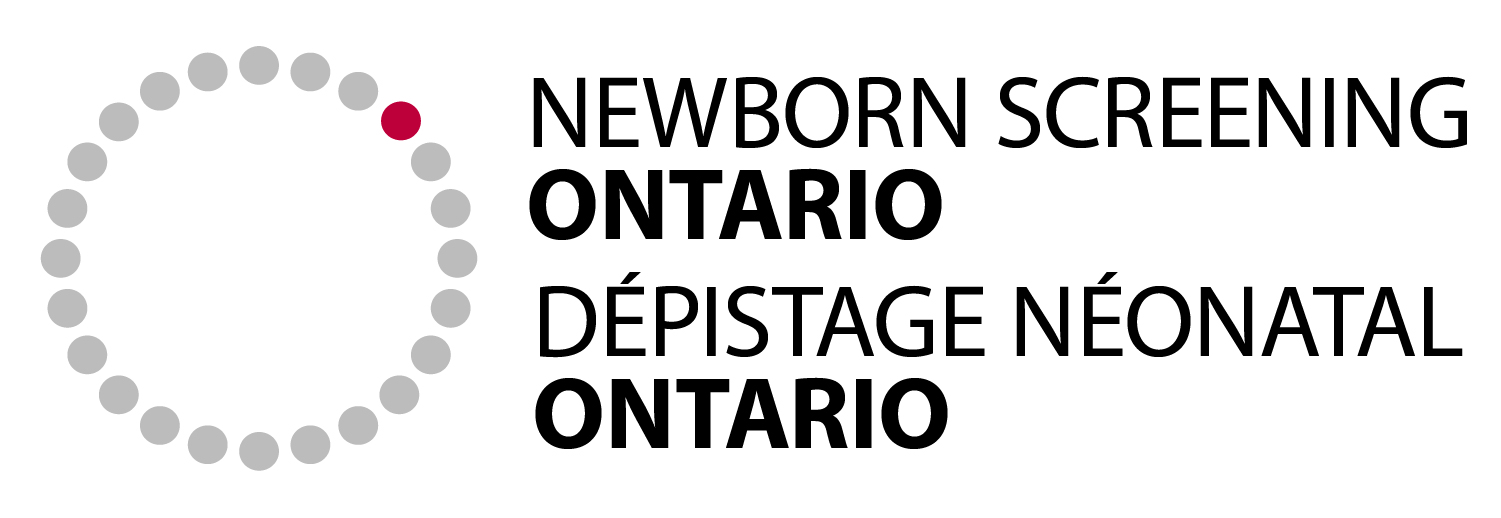- In Ontario, a heel prick is used to take a few drops of blood from each baby shortly after birth. The blood is tested for more than 25 treatable diseases, including congenital hypothyroidism (CH).
- A screen positive result means that more tests are needed to know whether or not a baby has congenital hypothyroidism. It does not mean that a baby has CH. Babies identified at a young age through screening can be treated early to help prevent health problems.
At a glance
| Approximate incidence in Ontario: | Marker measured: | Screening can prevent: | Treatment: |
| 1 in 3000 | Thyroid hormones | Developmental delay, failure to thrive | Thyroid hormone replacement |
CH is a condition where the baby is born with a thyroid gland (a small butterfly shaped organ in the neck) that is not working properly.
- "Congenital" means present at birth and "hypothyroidism" means there is not enough thyroid hormone.
- Thyroxine is a hormone important for growth and development of the body and brain. It is made by the thyroid gland.
- There are several possible causes of CH. The gland may not develop properly (e.g. it could be missing, in the wrong location, or smaller than usual) or it may look normal but not work properly. Sometimes a thyroid condition in the mother can affect the thyroid tests in the baby.
If diagnosed early, this condition is easily treated with daily oral (by mouth) thyroid medication.
Treatment allows children with CH to lead healthy lives with normal growth and development.
- It is normal for parents and guardians to feel worried when their baby has a screen positive result. A ‘screen positive’ result does not mean that a baby has CH. It means that there is a chance that the baby may have CH.
- Follow-up testing is important to find out whether the baby truly has CH.
- The baby’s health care provider or a health care provider at a newborn screening regional treatment centre will discuss the results with the baby’s family.
- Follow-up blood tests are arranged as soon as possible. A thyroid scan and/or ultrasound may also be done, to look at the baby’s thyroid gland.
- It can take a few days to weeks to find out if a baby truly has CH or not. This waiting period can be hard for families.
Possible follow-up test results
- Normal – the baby does not have CH.
- Abnormal – the baby does have CH and will need treatment. The family will be supported by a team of caring specialists.
- Inconclusive – more testing is required in order to determine if the baby does have CH or not. The baby will be followed closely by a specialist to ensure that he/she receives optimal care.
Most babies with CH appear normal at birth.
Early signs of CH can include:
- Puffy face
- Swelling around the eyes
- Poor feeding
- Constipation
- Yellowish skin (jaundice)
- Large soft spot on the head that is slow to close
Early treatment can prevent serious and permanent health problems, such as:
- Delayed milestones (sitting, crawling, walking)
- Intellectual impairment
- Poor growth
- Hearing loss
Treatment for CH begins as soon as possible and is usually lifelong.
- Daily medication (thyroid hormone replacement) is given to the baby by mouth.
- Babies with CH are cared for by their primary health care provider in consultation with an endocrine doctor (a hormone specialist) or pediatrician.
- Regular follow-up tests are used to monitor and adjust the treatment.
- Babies with CH have their health and development checked regularly.
With daily medication, children with CH can be as healthy and intelligent as other children their age.
If your baby has screened positive for CH, click here for more information.
Contact Us
Children’s Hospital of Eastern Ontario
415 Smyth Road
Ottawa, Ontario K1H 8M8
Toll-Free: 1-877-627-8330
Local: (613) 738-3222
Fax: (613) 738-0853
